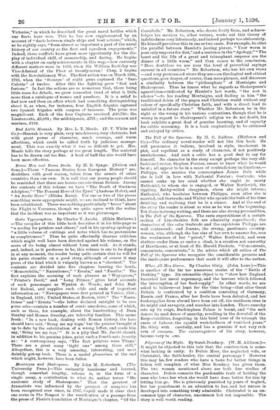Montaigne and Shakespeare. By John M. Robertson. (The University Press.)—This
eminently handsome and learned, though somewhat lengthy, volume is, in tha form of a , single essay, a contribution to what its author terms "the anatomic study of Shakespeare." That the greatest , of dramatists was influenced by the greatest of essayists has been recognised ever since, in 1767, Capell made it clear that one scene in The Tempest is the versification of a passage from the prose of Florio' s translation of Montaigne's chapter, "Of the
Cannibals." Mr. Robertson, who draws freely from, and acknow- ledges his services to, other writers, works out this theory of indebtedness very laboriously, and indeed perhaps too elaborately. He himself perceives this in one or two cases. For example, he cites the parallel between Hamlet's jeering phrase, "Your worm is your only emperor for diet," and a sentence in the "Apology," "The heart and the life of a great and triumphant emperor are the dinner of a little worm," and then comes to the conclusion, "Here doubtless we are near the level of proverbial sayings current in all countries." Mr. Robertson, who has his own views —and very pronounced views they are—on theological and ethical questions, goes deeper, of course, than mere phrases, and discovers a similarity between the "philosophies" of Montaigne and Shakespeare. Thus be traces what he regards as Shakespeare's agnosticism—indicated by Hamlet's last words, "the rest is silence "—to his reading Montaigne, and finding in him "the traditional deism of the pagan and Christian world without any colour of specifically Christian faith, and with a direct lead to unbelief in a future state." Whether Mr. Robertson be in the right or the wrong in his various contentions, though that he is wrong in regard to Shakespeare's religion we do not doubt, his book exhibits a great deal of genuine learning, and of capacity for subtle reasoning. It is a book emphatically to be criticised and enjoyed by critics.










































 Previous page
Previous page